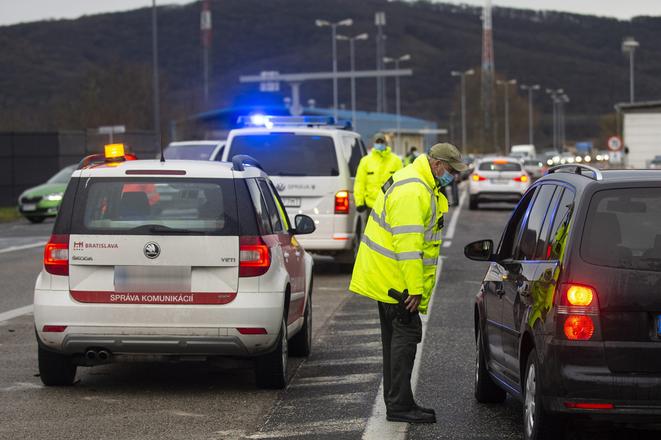Slovakia's border regime will change. The authorities cite the new strains spreading in Europe as the reason why Slovakia will tighten the rules for people arriving to the country from abroad.

Everybody crossing the borders from Wednesday, February 17, starting at 6:00, will have to register with the eHranica online form and self-isolate for 14 days upon arrival.
There will be some exceptions for cross-border commuters, and slightly different rules for people working in countries that do not border Slovakia, vaccinated people and people who have recovered from Covid.
At the same time, the police will reinforce patrols on borders from next week. The lowest category roads and border crossings with the least amount of traffic will be closed.
Slovakia's authorities strictly recommend against travelling abroad unless necessary.
These are the rules that apply as of February 17, 2021 at 6:00.
What changes for incomers?
All arrivals to Slovakia have to register with the eHranica online form prior to crossing the borders. They should be able to show confirmation of this to the police. People entering the country via the airports in Slovakia also have to fill in the form published on the Transport Ministry website.
After entering Slovakia, travellers are required to enter 14-day isolation either at their home or in a state quarantine facility if they need a place to quarantine.
They will be automatically registered (based on their filled-out form on eHranica) for a PCR test, which will take place no sooner than on the 8th day after their arrival. The costs of the test are covered by the state. Children younger than 10 years do not have to be tested.
Incomers from EU member states, Iceland, Norway, Liechtenstein, Switzerland and the UK will be able to end isolation after 14 days if they have no symptoms. Incomers from other states will have to wait until they receive a negative PCR test result.
Conditions for commuters from neighbouring EU countries
Cross-border commuters are exempt from the 14-day quarantine requirement under the following conditions.
People commuting between Slovakia and its neighbouring EU countries - Czech Republic, Austria, Hungary and Poland:
are not required to register with eHranica form
are required to showa negative antigen or PCR test result no older than 7 days (exception for children younger than 10 years applies)
cross-border workers need to show an employment contract.
Who qualifies as a cross-border commuter?
cross-border workers:
*everyone who lives in Slovakia and works in neighbouring countries and can prove they are working in the neighbouring state;
*people living in neighbouring countries within a 100-km distance from the open border crossing and who work in Slovakia within a 100-km distance from the border crossing and can prove they are working in Slovakia;
*Slovak citizens living within a 100-km distance from the open border crossing.
pupils and students
people taking care of their relatives
farmers taking care of a plot of land within 10 km from the borders
artists and other people working in culture who are exempt from home isolation and subsequent testing
athletes
Conditions for commuters from more distant EU, EEA countries and the UK
These rules apply to people living and working in EU countries, Iceland, Norway, Liechtenstein, Switzerland and the UK if they have permanent or temporary residence in Slovakia:
They have to register with the eHranice online form and choose a respective category.
They also need confirmation of their residence/work abroad (part of the ÚVZ ordinance);
Prior to their entrance, they need a negative PCR test result no older than 72 hours or antigen test result no older than 48 hours.
They will have to self-isolate. If they want to end isolation earlier than 8 days, they will have to pay for a PCR test. They can end quarantine as soon as they receive a negative result.
Conditions for people who have been vaccinated or have recently recovered from Covid
These rules apply to people who have recovered from Covid-19 recently, have permanent or temporary residence in Slovakia and are citizens of an EU member state, Iceland, Norway, Liechtenstein, Switzerland or the UK or have been to these countries in the past 14 days; and people who received the second vaccine shot more than 14 days prior, regardless of the country they are coming from. The rules come into force on Monday, April 19, at 6:00:
They have to register with the eHranice online form and choose a respective category. They also need confirmation that they have either:
*recently recovered from Covid according to a general practitioner and have a confirmation no older than 180 days (part of the ÚVZ ordinance);
*confirmation they have been vaccinated against Covid-19 and in the case of the mRNA vaccines (Pfizer/BioNTech and Moderna) more than 14 days have passed since their second dose, or in the case of the vector vaccine, AstraZeneca, more than four weeks have passed since their first dose;
*confirmation they have recovered from Covid-19 and have been vaccinated up to 180 days previously with either a vector or an mRNA vaccine and at least 14 days have passed since their first dose.
*The ÚVZ ordinance does not specify the required language of the confirmation.
Prior to their entrance, they need a negative PCR no older than 72 hours or an antigen test result no older than 48 hours.
They will have to self-isolate. They can end isolation after 14 days if they have no symptoms or after they receive a negative test result. They do not need to wait 8 days to take the test.
People who do not have permanent or temporary residence in Slovakia and have recovered from Covid-19 need to:
register with the eHranice online form prior to their arrival to Slovakia, self-isolate and take a test no sooner than 8 days after their arrival.
If they are citizens of an EU member state, Iceland, Norway, Liechtenstein, Switzerland or the UK, they can end isolation after 14 days if they do not have any symptoms. Citizens of other countries must wait until they receive a negative test result.
What are the exceptions?
Crew members of truck, bus, ship and railway transport are exempt from self-isolation; pilots and other plane crew members need to show confirmation from their employer in the Slovak language or the Green Lanes Certificate for International Transport Workers.
Other people who are exempt from self-isolation include:
rescue service crew transporting patients;
medics carrying organs for transplantation and blood;
funeral service employees;
medical staff, police forces, state employees and critical infrastructure staff with special permission;
diplomats and members of international organisations with special permission;
cabinet members with a special permission issued by the Public Health Authority. They need a negative PCR test result no older than 72 hours before returning to Slovakia.
There will also be an exception for those who come to Slovakia to get married or to attend the funeral of someone close to them. This also requires proof. One accompanying person will also have an exemption, requiring a negative antigen test no older than 48 hours or a RT-PCR test no older than 72 hours.
Mandatory quarantine will not apply to people with permanent or temporary residence in Slovakia, who cross the border to visit a foreign embassy accredited to Slovakia, located in the Czech Republic, Hungary or the Republic of Austria. This visit may not exceed 12 hours; in this case, a negative test for COVID-19 is not required.
Transit through Slovakia
People transiting through Slovakia do not have to self isolate if they meet the following conditions:
EU citizens and their family members travelling to other EU member state if their transit (including breaks for refuelling) lasts no more than eight hours;
people with permanent or temporary residence in EU member states who return to their home country if their transit (including breaks for refuelling) lasts no more than eight hours;
non-EU citizens if they travel to the EU member state where they have permanent or temporary residence if their transit (including breaks for refuelling) lasts no more than eight hours.
Source: Public Health Authority (UVZ) ordinance from April 15
Confirmation of employment as a cross-border worker, confirmation of recovery from Covid-19, and confirmation that a test was taken are part of the ÚVZ ordinance.
This article was first published on February 12, 2021.
Read more about the coronavirus in Slovakia:
Measures valid in Slovakia as of February 8 and updates on the requirement of a negative test result
Do I have the new coronavirus? How to proceed if you have a suspicion
I encountered a person who is COVID-19 positive. What do I do next? (FAQ)
When will I get my COVID vaccine? FAQs about vaccination in Slovakia



 Illustrative stock photo (source: TASR)
Illustrative stock photo (source: TASR)